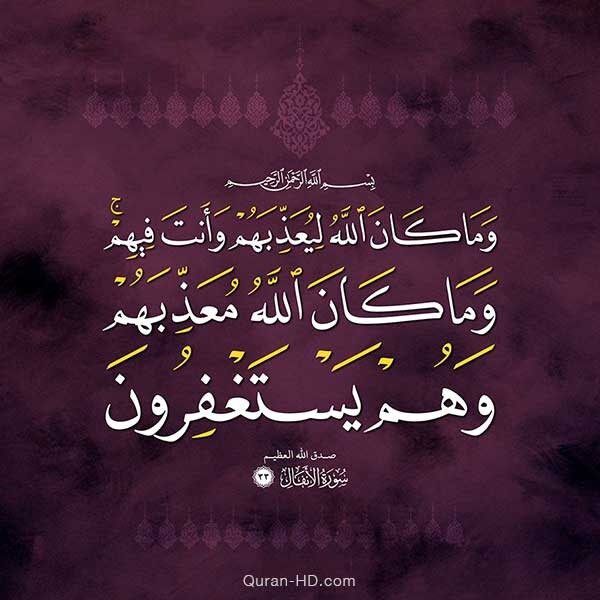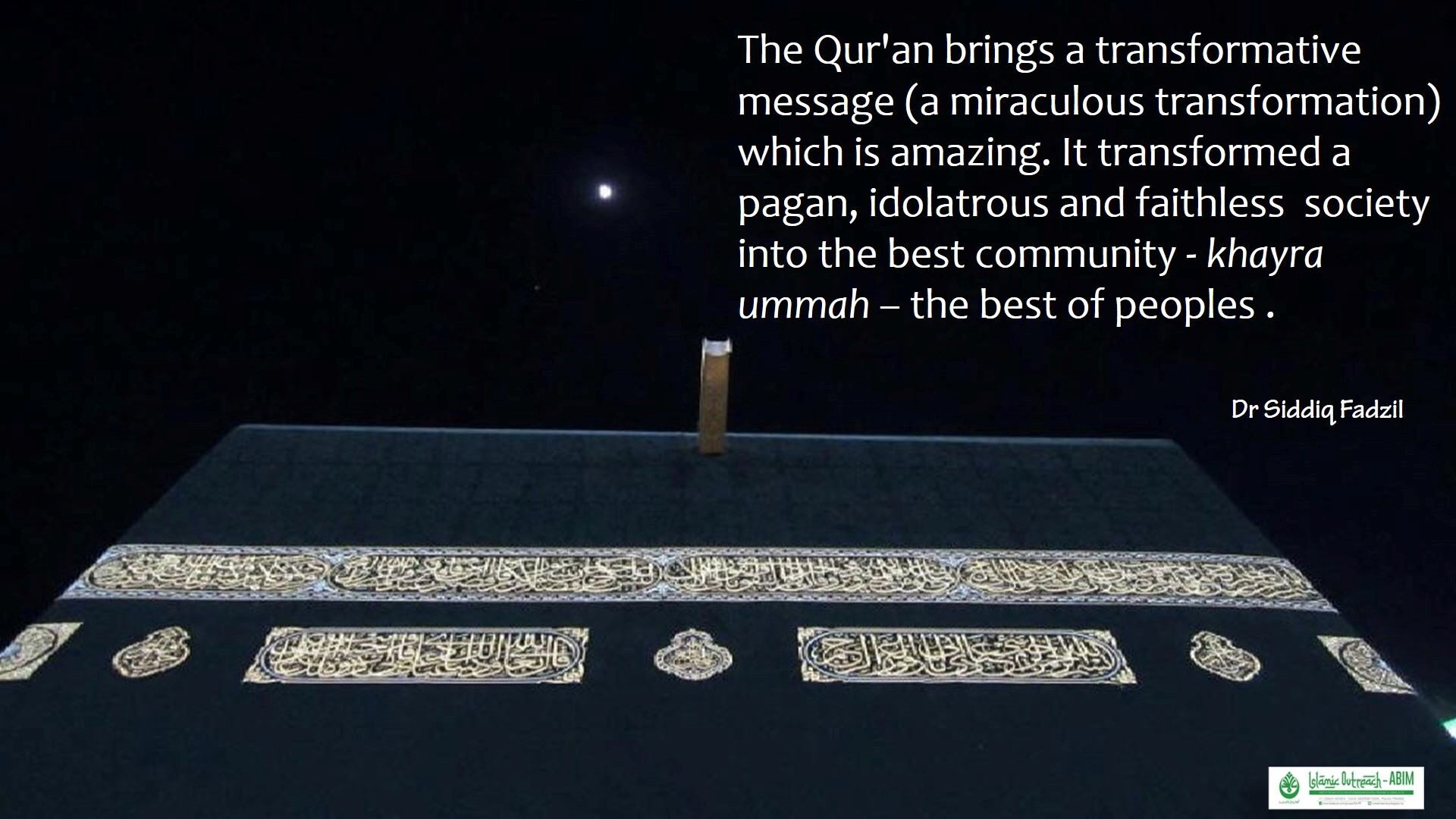Allah Does Not Punish His Servants As Long As …

In verse 33 of Al Qur’an: Surah al-Anfal : “But Allah would never punish them while you ˹O Prophet˺ were in their midst. Nor would He ever punish them if they prayed for forgiveness .”
Allah the Most Glorified, the Most High will not punish any people while in the midst of them there still stands the Prophet, Muhammad ﷺ . But what about us today? Prophet Muhammad ﷺ (peace and blessings of Allah be upon him), in person, is not with us today. Therefore, what can be our cause and protection from the torment of Allah?
Allah Almighty, because of His love, still gives us opportunities and offers answers. Allah has determined the ways and the means by which Allah Almighty would not punish us which is the practice of ISTIGHFAR, to pray and seek forgiveness from Allah, to repent directly to Allah.
So let’s pray and seek forgiveness and repentance as much as we can, especially during such a deeply worrying and agonizing situation right now. Try to seek forgiveness and repent as much as we can until to the point of exhaustion! Istighfar till our eyes droop to slumber. Istighfar till we lose count.
Remember, Allah Almighty, will not forsake His promise not to punish His servants who are still in good faith, devotedly praying and seeking His forgiveness.
AND IN TIMES LIKE THIS, BE HUMBLE, DO NOT BE ARROGANT
“Why did they not humble themselves when We made them suffer? Instead, their hearts were hardened, and Satan made their misdeeds appealing to them .” – Al-An`am 6:43.
(Ab Halim Ismail, Vice President, Movement for an Informed Society Malaysia WADAH)
A Brief Look at the Implications of the Revelations of the Qur’an

Ramadan Lecture by Dato Dr Siddiq Fadzil
22 June 2016
In the name of Allah Most Gracious Most Merciful.
1 We have indeed revealed this (Message) in the night of Power
2 And what will explain to thee what the Night of Power is?
3 The Night of Power is better than a thousand Months.
4 Therein come down the angels and the Spirit by Allah’s permission on every errand
5 Peace!… This until the rise of Morn!
(Surah 97: Al Qadr)
The Qur’an was revealed on the night of Laylatul Qadr, whose virtue is equivalent to ‘a thousand months’. According to deliberations by Muslim scholars, the term ‘a thousand months’ means ‘it is countless’, an abundance beyond measure not just in the ‘thousands’. This follows the method of interpretation, ‘the stated number is not limited but indicates much more’.
The Qur’an brings a transformative message (a miraculous transformation) which is amazing. It transformed a pagan, idolatrous and faithless society into the best community – Khayra Ummah – the best of peoples . The exemplary model of this khayra ummah society is such as shown by the example of the Sahabah of Rasulullah ﷺ, his Companions. The scholar Sayyid Qutb in his book ma’lim fi al toriq (Milestones) describes them as al jil ul quraniy il fariid (The Unique Quranic Generation).
The eminence of that generation of Companions was so great and wonderful, that it led to some scholars saying that other than the Qur’an, the existence of the glorious Companions itself is a ‘miracle’ affirming the truth of the Prophet, Muhammad ﷺ.
Maqasid of the Quran – Higher Objectives
Maqasid of the Qur’an is the basis of Maqasid al Shari’ah. It has been stated by many scholars including Al-Ghazali ( Jawaher Al-Quran), Rashid Redha (Al-Wahyu Muhammadi), Tahir Ibn ‘Ashur (Tafsir At-Tahreer wat Tanweer ), and Yusuf al Qaradhawi.
Scholars conclude that the Maqasid or higher objectives of the Qur’an signify: “The goals to actualize the goodness and wellbeing of mankind and human virtue” or “ Islahul Insan“. Humans need to be reformed and perfected as they are the administrators of the world. The Qur’an is revealed to develop and transform mankind so that man can administer and manage the world and nature to the best of his abilities.
Faithful and reformed people will serve and do good to the whole of humankind regardless of race, religion or skin colour. The person who has been enlightened and transformed is a person who serves the whole of mankind while being always in submission and devotion to Allah. The purpose or maqasid of human creation is to worship only Allah and to be of service to mankind.
The Mission of a Muslim: Serving Allah, being good and of service to Allah’s creatures.
Surah Ali-Imran verse 110 states clearly that Muslims are the best people to serve all of mankind. The term ‘Khayra Ummah’ as interpreted by scholars, means “the best of mankind”. This is in line with Islamic message and theme of Rahmah – “Blessings for Mankind”.
This means that people need to feel safe and secure being with the Muslim community. This is the character of the Muslim developed and reformed by the Qur’an.
The mission of khayra ummah is universal and humanitarian. Our message is a universal mission transcending nations and religions.
Al marhum Sheikh Taha Jabir Ulwani (rh) says: The Khayra Ummah are those who go forth, “liberating mankind from evil, error and darkness to come to the light.”
Here are just some of the themes on the mission of Islah in the Qur’an:
Aqidah (Creed or belief system):
This is the fundamental and most important principle as it will shape the concept of tawheed – belief in in only One God and it is liberating. The most essential phrase, dhikr is – la ilaha illallah (there is no god but Allah) – has great implications, in human liberation, in worshipping, in submission to Allah only, and serving nothing but Allah.
Islah Akhlaq– Nurturing virtue, morality and good manners and character
Islam has the unique capacity to transform its various theological tenets and values into practical and moral principles. The Islamic Shariah was specifically established to instil gracious behaviour and lofty morals among its adherents and to refine their characters, all of which contributes to general well being among people and throughout the land. These goals are aimed at guaranteeing a safe and peaceful existence for each person and protecting all aspects of the lives of individuals, whether in the arena of beliefs, wealth, honour, or peace of mind.
History
The purpose of historical narration is to chronicle the mission of the Messengers of Allah – reminiscing ‘the days of Allah’, glorifying His Greatness. History is a medium for genuine transformation, Islah. In order to change, people need to learn from history. The Quran presents various stories and events to learn and discover from. Events are expressed to highlight human endeavours in transforming people if only people would learn from history.
Among them:
The story of Dzulqarnayn in empowering a weak community to build a wall, an engineering solution to thwart the threat of great terror. This powerful king Dzulqarnayn called for the help of the people themselves by saying, “Help me with your strength”, alluding to the community’s self confidence meaning “You are not weak, you are strong”.
The story of Musa a.s. who brought political reform and liberated the Children of Israel, empowering them to determine their future. The momentous saga of Musa and the Children of Israel – in freeing the captivated minds and souls of the Children of Israel and escaping from tyranny and oppression in Egypt.
The story of Prophet Sulaiman a.s. and Queen Balqis:
Sulaiman a.s. listened attentively to the view of a little bird, the Hud-Hud, the hoopoe even though he was a mighty king and the greatest leader of his time. The tiny Hud-Hud gave an opinion, though he was just a quivering bird. Small and meek people should not be underestimated and big powerful people do not know everything.
Queen Balqis, although a woman, was able to lead well and adopted mutual consultation with her advisers listening to counsel, showing wisdom in the administration of her land. Therefore, do not minimize the ability of a woman to lead wisely as told by the story of Queen Balqis.
If we fail to comprehend and understand history, then we cannot afford to go forward. Like the saying, “How can you know where you are going, if you do not know where you have been”.
(Ramadan speech by Dato Dr Siddiq Fadzil at Kolej Darul Hikmah in conjunction with Iftar Jamaiyy WADAH, ABIM and PKPIM 2016)
ISLAMIC OUTREACH ABIM PENANG